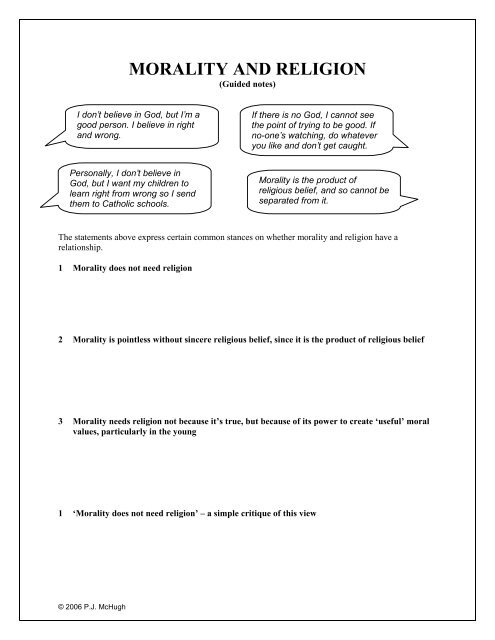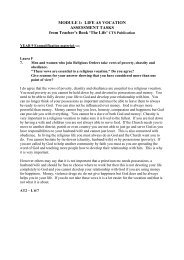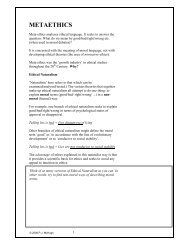Create successful ePaper yourself
Turn your PDF publications into a flip-book with our unique Google optimized e-Paper software.
<strong>MORALITY</strong> <strong>AND</strong> <strong>RELIGION</strong><br />
(Guided notes)<br />
I don’t believe in God, but I’m a<br />
good person. I believe in right<br />
and wrong.<br />
If there is no God, I cannot see<br />
the point of trying to be good. If<br />
no-one’s watching, do whatever<br />
you like and don’t get caught.<br />
Personally, I don’t believe in<br />
God, but I want my children to<br />
learn right from wrong so I send<br />
them to Catholic schools.<br />
Morality is the product of<br />
religious belief, and so cannot be<br />
separated from it.<br />
The statements above express certain common stances on whether morality and religion have a<br />
relationship.<br />
1 Morality does not need religion<br />
2 Morality is pointless without sincere religious belief, since it is the product of religious belief<br />
3 Morality needs religion not because it’s true, but because of its power to create ‘useful’ moral<br />
values, particularly in the young<br />
1 ‘Morality does not need religion’ – a simple critique of this view<br />
© 2006 P.J. McHugh
Supporting points<br />
Opposing points<br />
• religion is apparently the cause of much<br />
conflict on personal, communal and<br />
national levels<br />
• religion is the lynchpin of objective moral<br />
values<br />
• moral behaviour naturally arises when<br />
people live in societies and begin to<br />
recognise mutual rights and duties<br />
• Judeo-Christian values transformed ancient<br />
societies and now lie at the heart of<br />
Western judicial and social systems<br />
• Many people who don’t profess to be<br />
religious still feel a strong sense of moral<br />
obligation<br />
• the antithesis to religious belief is<br />
relativism – what kind of morality does<br />
relativism yield<br />
• People can have as the basis for their<br />
morals a simple human sympathy and<br />
empathy with others – why hold to a bunch<br />
of religious beliefs<br />
• Religious people ‘do God’s will’. Is that<br />
the same as behaving morally<br />
© 2006 P.J. McHugh
Moral Relativism – a viable alternative to Religion-based ethics<br />
Some Definitions<br />
(Epistemological) Relativism<br />
Relativism, in all its various shades, basically holds that truths and convictions are not universal. They are<br />
relative to people, times and cultures. And since people can’t escape their own subjectivity, culture and<br />
time, they can only speak of ‘how they see things’. Relativists don’t believe in truth with a capital T.<br />
There’s my truth and your truth – but there’s no absolute Truth.<br />
• Religion gives us ‘truths’ not Truth.<br />
• These ‘truths’ are local to the people, time and culture that expressed them; they are not universal.<br />
They do not and cannot hold for all time.<br />
Question<br />
You could argue that E. Relativism does accept at least one universal truth – Truth with a capital T.<br />
What<br />
(Moral) Relativism<br />
Epistemological Relativism leads directly to Moral Relativism.<br />
Once you say that religious beliefs are only ‘true for’ the<br />
believers who express them, then what happens when some of<br />
these beliefs are about moral behaviour<br />
Answer: you will not accept these moral rules and universally<br />
binding. You will say: ‘it’s just your view/opinion’ when a<br />
believer states that ‘X is wrong or right’.<br />
Many people, whether they know it or not, are moral relativists.<br />
The statement below, a view commonly expressed, is essentially<br />
in tune with moral relativism:<br />
‘No-one can tell you what’s right and wrong: you’ve just got to<br />
make your own mind up and do what’s right for you.’<br />
‘Some say that X is wrong but I feel we’ve moved on in our<br />
thinking. After all these are the nineties, two-thousands, …’<br />
Anyone<br />
who<br />
commits<br />
sin is a<br />
slave to<br />
sin.<br />
An interesting idea from a<br />
Palestinian preacher. Very<br />
obviously he’s steeped in<br />
Hebrew customs and ideas,<br />
using such notions as ‘sin’<br />
– an idea relevant to his<br />
culture, but not to ours.<br />
Moral Relativism may be discussed on a cultural level or on a<br />
personal level.<br />
© 2006 P.J. McHugh
It is indisputable that some values vary from culture to culture, such as wearing clothes, child marriages,<br />
and eating the bodies of dead relatives. Although many of these values are more like rules of etiquette<br />
than rules of morality, it is clear that at least some important moral values vary from culture to culture.<br />
For example, in Mainland China, abortion is recognized as an important tool for population control. In the<br />
Republic of Ireland, though, abortions are not readily available even when the life of a mother is at risk.<br />
Critics of moral relativism sometimes challenge the idea of cultural variation, defined above. For example<br />
in Elements of Moral Philosophy James Rachels attacks moral relativism arguing that there is in fact a<br />
core set of values that are common to all societies and are in fact necessary for any society to exist. These<br />
values are (1) we should care for children, (2) we should tell the truth, and (3) we should not murder.<br />
Critics also point out problems of consistency with moral relativism. For example, if moral relativism is<br />
true, then we could no longer say that customs of other societies such as slavery are morally inferior to<br />
our own.<br />
An analysis of Cultural Moral Relativism<br />
• Observed fact: different cultures have different moral codes<br />
o different things are taboo or obligatory<br />
among the Greeks<br />
morally obliged to burn corpses<br />
morally forbidden to eat them<br />
among the Callatians<br />
morally obliged to eat corpses<br />
morally forbidden to burn them<br />
• Relativist Conclusion drawn from facts like these<br />
o There is no universal morality -- no morality per se; rather just<br />
Ancient Greek morality<br />
Callatian morality<br />
traditional Eskimo morality<br />
o ‘X is good’ is an incomplete expression meaning ‘X is good in culture Y’.<br />
• The Argument<br />
1. Different cultures have different moral codes<br />
2. So, there is no objective right or wrong, no objective good or evil<br />
Criticism: the argument is unsound: conclusion doesn't follow from the factual premise<br />
1. Ancients believed the earth was flat & we believe it's spherical or "round".<br />
2. Therefore, the earth has no objective shape.<br />
1. flat for the ancients<br />
2. round for us<br />
3. but the earth is really round -- the ancients were just wrong<br />
o In general it does not follow from the fact of disagreement that there is no fact of the<br />
matter being disagreed about.<br />
© 2006 P.J. McHugh
The Consequences of Taking Cultural Relativism Seriously<br />
• Reductio ad absurdum argument<br />
Absurdities following from the assumption of CR<br />
o We could no longer say that the customs of other societies are morally inferior to our<br />
own: criticism (or praise) of another culture's practices could never be warranted<br />
e.g. the treatment of women/children in some parts of the world<br />
e.g. the practice of enforced female circumcision in certain parts of Africa<br />
o We could decide whether actions are right or wrong just by consulting the standards of<br />
our society.<br />
a. e.g., the abolitionists were wrong to condemn slavery as immoral since -<br />
according to the standards of their antebellum culture -- there was nothing wrong<br />
with it.<br />
would-be moral reformers are automatically mistaken: every society would of<br />
necessity be morally perfect<br />
morality is whatever a culture believes it to be<br />
so a culture’s moral beliefs could never fail to correspond to what's really<br />
moral (since the cultures believing it so makes it so)<br />
possibility of moral progress called into doubt: How can you improve on<br />
perfection<br />
Why there is less disagreement than it seems<br />
• Many seeming differences are merely surface differences<br />
• Example<br />
o both Callations and Greeks acknowledged obligation to honour their dead<br />
Callations by eating them<br />
Greeks by cremating them<br />
But "honour thy dead" is a value they share<br />
How All Cultures Have Some Values in Common<br />
• Values necessary for survival of a culture, presumably<br />
o For example, the philosopher James Rachels claims these as universal values:<br />
caring for their young<br />
truth telling<br />
prohibition of murder<br />
• C.S. Lewis, in his famous book ‘The Abolition of Man’ asserted that there was a common strand<br />
of moral values across many cultures<br />
© 2006 P.J. McHugh
Moral Relativism expressed on a more personal level<br />
Question<br />
Read the imaginary conversation of the right.<br />
What deep philosophical weakness does it reveal in Moral<br />
Relativism<br />
YES …<br />
then why should I<br />
accept it<br />
<strong>AND</strong> SO …<br />
Relativism cannot be<br />
used to ‘explain away’<br />
religious/moral beliefs.<br />
STATEMENT 1<br />
There are no rights and<br />
wrongs – just opinions<br />
about right and wrong.<br />
Is ‘Statement 1’ an<br />
opinion about right and<br />
wrong<br />
NO…<br />
then it claims the<br />
same authority as<br />
religious beliefs.<br />
<strong>AND</strong> SO …<br />
Relativism claims<br />
‘Truth with a capital T’,<br />
just like religions do<br />
I So is nothing really right or wrong -<br />
it’s all just your opinion<br />
J Yes.<br />
I So if I say adultery is wrong or abortion<br />
is wrong - it’s just an opinion<br />
J Yes, it’s just your opinion. I don’t<br />
have to believe it.<br />
I What about shoplifting, fare-dodging,<br />
swearing, perjury, gossip, vandalism<br />
J Just your opinion.<br />
I What about abusing the environment<br />
J I personally believe that wrong.<br />
I But it’s just your opinion<br />
J Yes, but most people agree with me.<br />
I What about child abuse or beating up<br />
the elderly and robbing them Are<br />
these really wrong or just my opinion<br />
J Well, in my opinion, these are very wrong.<br />
I But someone like you believes it’s just<br />
an opinion that these things are wrong.<br />
Others can accept or reject the opinion.<br />
I Yes, but the law would stop such people<br />
from abusing children or mugging the<br />
elderly.<br />
J So the law obviously thinks some things<br />
are right and other things wrong<br />
I Yes, I suppose so, but laws change.<br />
J Do you really believe that there’s no<br />
such thing as true right or wrong<br />
I I believe statements about right and<br />
wrong are just personal views - it’s just<br />
your opinion.<br />
J Then the statement ‘it’s just your opinion’<br />
is just an opinion I can accept or reject<br />
I I suppose so.<br />
J I reject it, then.<br />
is<br />
© 2006 P.J. McHugh
Some attractions and dangers in Moral Relativism<br />
Having read, discussed and considered the implications of Relativism, particularly Moral Relativism,<br />
what would you consider to be its main attractions and dangers<br />
attractions<br />
dangers<br />
List some values that you think people in Britain<br />
should all accept as binding.<br />
should be free to disagree about.<br />
© 2006 P.J. McHugh
Return to superstition<br />
It might be argued that Relativism lets superstition back in. It is not commonly known that monotheistic<br />
faith (Judaism, Christianity, Islam) were historically the enemy of superstition. Monotheistic faith is the<br />
mother of reason and scientific enquiry, since it clears away the clutter of superstition and opens the way<br />
for a spirit of wonder and enquiry about the universe.<br />
The writer and commentator, G.K. Chesterton said something like: ‘When people stop believing in God,<br />
they don’t just believe in nothing; they believe in anything.’<br />
What do you think he means<br />
Moral Relativism – anything goes<br />
Another line of criticism against Moral Relativism is that it literally could be invoked to justify any<br />
behaviour or practice as morally acceptable. What remains, if anything goes<br />
Moral Relativists might reply:<br />
• Although we reject universally binding rules, we still see the need for codes of conduct in a healthy<br />
society.<br />
• These codes of conduct could be based on simple human reasoning – e.g. don’t hurt others, don’t<br />
infringe on their rights, equal justice for all, etc.<br />
But critics could still go further:<br />
• How will you secure agreement about a basic code of conduct when there might be many variations<br />
Whose code will win out<br />
• How will you deal with the attitude which says, ‘Other people should follow the code, but if it suits<br />
me, and if I can get away with it, then I won’t’<br />
You neglect the metaphysical foundations of values. Value notions like justice, equality and concern for<br />
the weakest in society were not decided by a committee meeting. They arose in the context of religious<br />
belief and religious cultures – pre-eminently, the religious culture of the Hebrews.<br />
© 2006 P.J. McHugh
















